Boost Efficiency by 50% with Our High-Powered Aluminum Conveyor System
Table of Contents
What are Aluminum Conveyors?
Aluminum conveyors are conveyor systems that are made primarily of aluminum components. These conveyors are lightweight, durable, and corrosion-resistant, making them ideal for a variety of industries and applications.
Aluminum conveyors are commonly used in industries such as food processing, pharmaceuticals, electronics, and automotive manufacturing.
These conveyors can be customized to meet specific requirements and can be easily integrated into existing production lines.
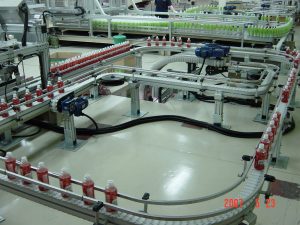
Industries that Use aluminum Conveyors
Aluminum conveyors are commonly used in industries such as food processing, pharmaceuticals, packaging, automotive, and electronics.
These conveyors are also used in warehouses, distribution centers, and manufacturing facilities for material handling and transportation of goods.
Additionally, aluminum conveyors are often used in cleanroom environments due to their corrosion resistance and ease of cleaning.
Growth of Conveyor Systems
Conveyor systems are becoming more widely used and popular.
The market is expected to reach $12.01 billion by 2028. Conveyor businesses in the commercial and civil sectors are rapidly expanding their implementation in locations such as airports, shopping malls, stadiums, and restaurants.
These conveyor systems are extremely popular in the manufacturing and packaging industries, as well as production plants, and as demand for these systems rises, the systems excel at allowing businesses to meet consumer demand, making them more important in the manufacturing process than ever. Line shaft roller, chain, and conveyor belt systems are among the most used.
Materials Used in aluminum Belt Conveyor Systems for Impact and Wear Resistance
Aluminum belt conveyors must be impact- and wear-resistant due to the high volume of products they transport, which might be sharp and heavy, and they must not become seized due to deformation.
These conveyors handle materials such as UHMW, nylon, Nylatron NSM, HDPE, Tivar, Tivar ESd, and polyurethane. The handling material used will be determined by the conveyor’s function, and if static control is required, the conveyors will require particular materials designed to either dissipate or transmit electrical charges from the conveyors.
As ENTRA said briefly before, there are many different types of conveyors that may be employed, and the conveyors you use or purchase are determined by what you need them to do. For example, using roller conveyors to speed up people’s walks between two distinct terminals at an airport would be inefficient; instead, belt conveyors would be preferable.Check out Other Products
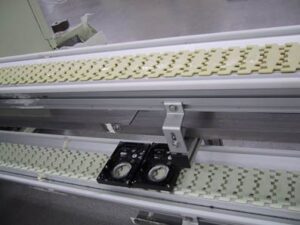
Aluminum Conveyors can safely carry materials from one level to another via elevated systems.
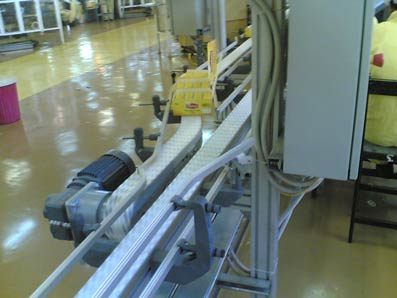
they can be implemented in most scenarios while typically adding value and increasing worker safety
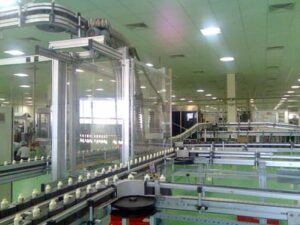
Aluminum belt conveyors are capable of moving large amounts of objects of different weights, sizes, and shapes.
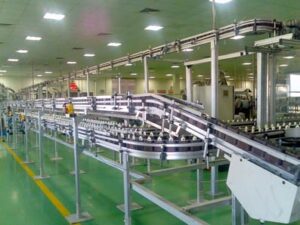
To power the conveying systems, ENTRA provides a range of conveyors, including fully automated, mechanical ones
We do agree that businesses should prioritize conveyor system maintenance to avoid downtime or disruptions in their manufacturing, packaging, or delivery processes. You may, of course, analyze the operation of your system using a human-machine interface (HMI), which allows you to analyze and monitor historical and real-time data.
Ahmed Abdel Ghaffar
How many types of conveyors are available on the market these days?
- Aero-mechanical
- Automotive
- Belt conveyor
- Chain
- Chain-driven live roller
- Flexible
- Gravity
- Pharmaceutical
- Plastic belt
- Pneumatic
- Screw or auger conveyor
- Vibrating
Our modular conveyor designs offer complete system flexibility, meaning conveyor systems can be scaled up or down with ease to work in line with your production requirements
FAQ
What are the benefits of using aluminum conveyors?
Aluminum conveyors offer benefits such as lightweight construction, durability, corrosion resistance, and versatility for various industries.
How do I find reliable aluminum conveyor manufacturers?
Look for top aluminum conveyor manufacturers known for quality products, reliable services, and cost-effective solutions.
Are aluminum conveyors suitable for industrial applications?
Yes, aluminum conveyors are commonly used in industrial settings due to their strength, durability, and corrosion-resistant properties.
What factors should I consider when choosing an aluminum conveyor system?
Consider factors like conveyor type (belt, roller, slat), load capacity, speed requirements, customization options, and maintenance needs.
Can I purchase aluminum conveyors online?
Yes, you can buy aluminum conveyors online from ENTRA Conveyors, as we offer a range of options and accessories for easy purchase.
Do aluminum conveyors require specific maintenance procedures?
Yes, aluminum conveyors need regular maintenance like cleaning, lubrication, inspection of parts, and following manufacturer’s guidelines.
How can I install an aluminum conveyor system properly?
Seek professional installation services from ENTRA Conveyors or follow the provided assembly guide to ensure correct setup and functionality of your aluminum conveyor system
Are there customizable options available for aluminum conveyors?
Yes, many manufacturers offer customizable aluminum conveyor solutions to meet specific requirements and industry needs.
Do You Need a Conveyor System?
If you need a conveyor system for the logistics sector, food industry, or commercial purposes, ENTRA is delighted to assist.
Contact us today to discuss your requirements and create a custom solution for your organization.Read more about other categories
